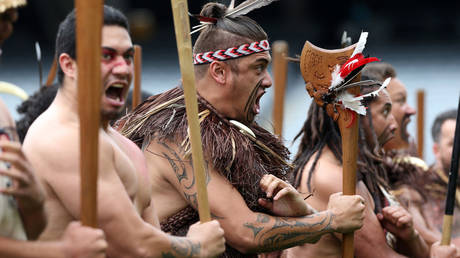Maori tribe issues demand to elite auction house
A Maori tribe in New Zealand has called upon Sotheby’s to return artifacts that are currently up for auction. source:TROIB RTS

The items on sale at Sotheby’s are crucial cultural treasures, the indigenous people of New Zealand say
A Maori tribe in New Zealand has urged Sotheby’s to return historical artifacts that are currently up for auction.
The collection of 18th and 19th century tribal relics includes amongst others a ‘patu onewa’ and ‘mere’ Maori clubs, leg bones of extinct moas and a golden huia beak brooch.
Ngarimu Blair, deputy chair for the Auckland-based Maori sub-tribe Ngati Whatua Orakei, told The Guardian on Thursday that these are some of his people’s crucial cultural treasures, or ‘taonga’.
“We have so very few of these taonga and treasures left in our possession,” due to looting by early “treasure hunters,” urbanization, and displacement, Blair said. “When something like this comes up … we’re both excited, but also … sorrowful that we lost so much.”
One of the items on sale is a ‘mere’, which, according to its description on the Sotheby’s page, was given as present to a British vice admiral by a Maori tribal chief in 1885.
Not mentioned in the story: the mere was gifted to Vice-Admiral Tryon in 1896 under the condition that it stay in his family. But someone’s decided to flog it off for £40k. Since Tryon’s whanau couldn’t look after it I reckon it should be returned. https://t.co/mv9OEWSled
— Mike Dickison (@adzebill) January 2, 2023
Mike Dickison, a former curator of Whanganui Regional Museum, told the website Stuff last week that the auctioned golden huia beak brooch actually comes from the town of Whanganui on New Zealand’s North Island. It was made by the founder of the museum, Samuel Drew, who was a jeweler, natural history expert, and taxidermist.
“So if they [Sotheby’s] had bothered to do any research, they probably could have found some context and perhaps even returned it to the area,” Dickison said.
READ MORE: New Zealand mandates jargon cutback
Sotheby’s has sold a number of valuable Maori artifacts over the years, including a ‘tekoteko’ (a carved gable figure), which fetched $740,000 in 2019. The auction house described the item as “a major Maori sculpture,” but said it had “no remaining trace of its original provenance.”
The sale of Maori items is currently strictly regulated by the New Zealand authorities, but the laws do not apply internationally. The tribes, therefore, can only count on the good will of the auctioneers or buyers if they wish to have the items returned.












